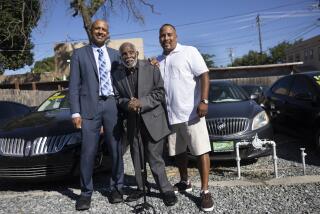Supreme Court restores death sentence in 1982 Tarzana murders
- Share via
Reporting from Washington — The Supreme Court restored a death sentence for a Van Nuys murderer Monday, despite evidence that he suffered severe brain damage as a child.
Scott Pinholster, who stabbed two men to death in a drug robbery gone bad in Tarzana in 1982, is an epileptic who suffered blows to the head in two auto accidents. His mother backed her car into him when he was 2, and his head slammed into the windshield during an accident a year or two later. By age 10, he was having outbursts at school. At 11, he was sent to a mental institution.
The evidence of brain trauma did not figure significantly in Pinholster’s trial in 1984. His lawyer did not bring a mental health expert to court to try to persuade the jury to sentence his client to life in prison rather than death. The lone defense witness was his mother, who described the accidents and his troubles in school.
Most of the testimony about his brain damage came nearly 15 years later in a federal court hearing in Los Angeles. That testimony prompted a federal judge and the U.S. 9th Circuit Court of Appeals to reverse Pinholster’s death sentence.
The question for the Supreme Court was whether federal judges erred by relying on the new testimony as the basis for reversing the earlier rulings of California courts, which had affirmed the death sentence.
By a 5-4 vote, the high court concluded that the federal judges were wrong to have second-guessed the decision of the state courts. Justice Clarence Thomas delivered the decision and relied on a 1996 law that said federal judges should defer to reasonable rulings of state courts.
Thomas said in the ruling that the jurors had heard the basic details of Pinholster’s miserable childhood, and they had at least heard about the auto accidents.
“Given what little additional mitigating evidence Pinholster presented … the court cannot say that the state Supreme Court’s determination [upholding the death sentence] was unreasonable,” he wrote.
Chief Justice John G. Roberts Jr. and Justices Antonin Scalia, Anthony M. Kennedy and Samuel A. Alito Jr. agreed.
The dissenters, although split among themselves, said the new evidence should have been considered, and that the trial lawyers failed miserably by not emphasizing brain damage at the sentencing hearing.
In the dissenting opinion, Justice Sonia Sotomayor called Pinholster’s lawyer “woefully inadequate.” She said at least some of the jurors would have voted in favor of life in prison had they known the full story. Justices Ruth Bader Ginsburg and Elena Kagan agreed with her, and Justice Stephen G. Breyer dissented separately.
More to Read
Sign up for Essential California
The most important California stories and recommendations in your inbox every morning.
You may occasionally receive promotional content from the Los Angeles Times.











